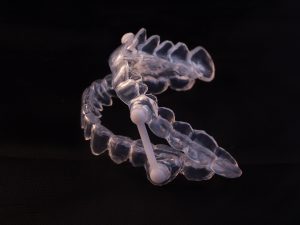 Sleep apnea is a condition that’s associated with snoring, but that’s not the only concern. The most common form of the disorder is caused by an obstruction in the upper airway. Obstructive sleep apnea (OSA) can result in frequent breathing disruptions. Each pause in breathing depletes your body of oxygen, placing you at risk of many health conditions that can shorten your lifespan with no treatment. Here’s how sleep apnea therapy can add more years to your life expectancy.
Sleep apnea is a condition that’s associated with snoring, but that’s not the only concern. The most common form of the disorder is caused by an obstruction in the upper airway. Obstructive sleep apnea (OSA) can result in frequent breathing disruptions. Each pause in breathing depletes your body of oxygen, placing you at risk of many health conditions that can shorten your lifespan with no treatment. Here’s how sleep apnea therapy can add more years to your life expectancy.
Risks of Untreated Sleep Apnea
The soft tissues in the back of the mouth relax when sleeping. They can create a blockage in the upper airway, causing many interruptions in breathing throughout the night. Your body will be deprived of oxygen repeatedly. Although you resume regular breathing, the long-term stress on your body is connected to potentially deadly complications, like:
- Sleep deprivation
- High blood pressure
- Cardiovascular disease
- Type 2 diabetes
- Metabolic syndrome
- Liver complications
Signs of Obstructive Sleep Apnea
While snoring is a common sign of sleep apnea, it’s not the only symptom. It’s not unusual to experience:
- Daytime fatigue
- Morning headaches
- Waking up choking or gasping for air
- Memory loss
- Mood changes or irritability
- Difficulty concentrating
If you or your physician suspect sleep apnea, you’ll need to undergo further testing to confirm the diagnosis. You’ll be monitored while you sleep to detect any abnormalities.
Risk Factors for Obstructive Sleep Apnea
Although anyone can develop sleep apnea, it’s associated with many risk factors, including:
- Obesity
- Large neck circumference
- Being make
- Being older
- Family history
- Smoking
- Use of alcohol or sedatives
- Nasal congestion
Treating Obstructive Sleep Apnea
If you’re diagnosed with sleep apnea, don’t place your life at risk. You have many options to treat the condition, including:
- CPAP: A CPAP is the most traditional method of treating OSA. A steady stream of air pressure is delivered through a mask placed over the mouth or nose to prevent pauses in breathing. Although it’s effective, it can be bothersome for some patients.
- Oral Appliance: An oral appliance is a comfortable alternative to a CPAP; however, it can also be used along with the machine. The custom-fit device holds the tongue and jaw in more comfortable positions to prevent them from blocking the airway. It’s an effective solution for mild-to-moderate cases of OSA.
Your sleep specialist will review your options to find a perfect solution to treat your sleep apnea. You’ll sleep peacefully knowing you’re safeguarding your health from issues that can take years off of your life. Don’t spend another night struggling to breathe.
About Dr. Stephanie Gorczyca
Dr. Gorczyca earned her dental degree from the UCLA School of Dentistry and has regularly continued her education in many specialties, like oral appliance therapy. She is a proud member of many professional organizations, including the American Dental Association. If you need treatment for sleep apnea, request an appointment through our website or call (702) 602-4000.
